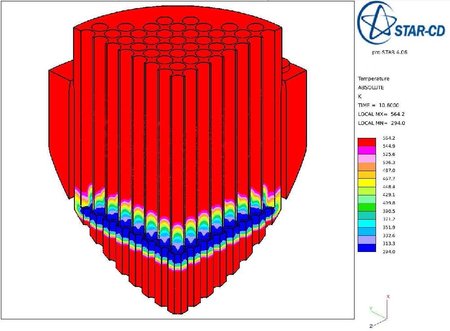STARS V
STARS V, Safety Research in Relation to Transient Analysis for the Reactors in Switzerland: the remit for the STARS project, which has been in progress since 1988, is to update and continue the development of methods and computer programmes used to carry out deterministic safety analyses. STARS performs stationary and incident-induced neutron- physical and thermohydraulic calculations for systems, reactor cores and other configurations such as storage facilities or tanks in order to support ENSI in assessing compliance with the defence-in-depth safety concept and the effectiveness (integrity) of successive defence-in-depth barriers for nuclear power plants. A new feature added in 2009 was assistance with setting up ENSI’s “Deterministic safety analyses” section. The research work undertaken in the year 2009 comprised the following activities:
- In the area of fuel behaviour, development of the Falcon computer programme was advanced by implementing experimentally validated physical models.
- In the systems technology area, the existing models of all Swiss nuclear plants were migrated to the Trace computer programme – the latest simulation programme for the system behaviour of light water reactors. The models were validated with the help of existing plant data, by recalculating experiments on large-scale technical test plants, and by comparisons with other computing programmes that had already been validated. Another long-term goal is to introduce integral analysis methods which (for example) can be used to adduce physical models, the level of detail of spatial modelling, and interfaces between the analysis programmes on a problemspecific basis (multi-physics). A prototype procedure was developed whereby a 3D-model of the RPV of the European Pressurized Water Reactor (EPR) could be generated. Finally, CFD (Computational Fluid Dynamics) programme applications were developed for the EPR and the BWR/6 boiling water reactor (Leibstadt nuclear power plant).
- The reactor core research area focused on the quantification of uncertainties in the analysis of reactor core and plant transients in connection with the use of multi-physics programme systems. STARS took part in an OECD comparative test entailing the analysis of the effects of uncertainties in effective cross-sectional data (used to measure the probability of interaction between neutrons and atomic nuclei). For this purpose, the direct uncertainties of the effective cross-sections were considered as well as those of their models in a dynamic 3D-reactor model. As expected, the calculation of the nuclear heating process for a boiling water reactor showed that the reactor power progression is heavily dependent on the effective cross-sections, because the interaction between nuclear and thermohydraulic effects is strong at low power levels.


